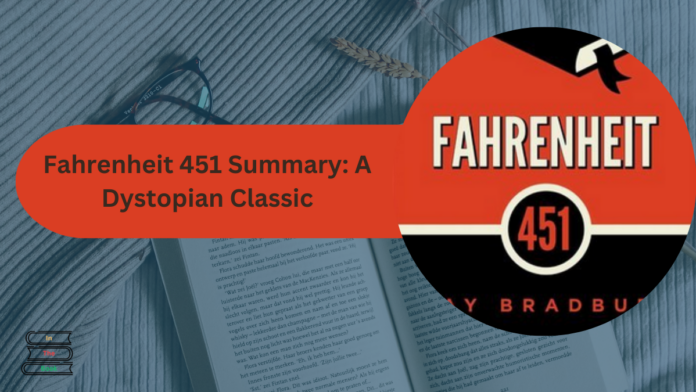Fahrenheit 451 summary delves into a dystopian future where books are banned and critical thinking is suppressed. Authored by Ray Bradbury, this novel paints a bleak picture of a society where firemen are tasked with burning books, rather than extinguishing fires. The narrative centers around Guy Montag, a fireman who undergoes a profound transformation as he grapples with the consequences of intellectual suppression.
Contents
Fahrenheit 451 Book Summary: A World Without Books
In this fahrenheit 451 book summary, society is portrayed as superficially content, absorbed in mind-numbing entertainment provided by wall-to-wall TVs and constant streams of digital media. However, amidst this facade of contentment lies a deep-seated fear of knowledge and independent thought. Montag’s encounter with Clarisse McClellan, a curious young woman who cherishes books, ignites a dormant curiosity within him. This sparks a journey of self-discovery and rebellion against the oppressive regime that controls every aspect of life.
The Journey of Guy Montag
Guy Montag’s evolution in the fahrenheit 451 book summary is marked by his gradual disillusionment with his role as a fireman. Initially a staunch enforcer of censorship, Montag begins to question the morality of his actions as he witnesses the passion and intellect that books represent through Clarisse and others he encounters. His clandestine decision to start reading confiscated books opens his eyes to a world of ideas and perspectives that were previously forbidden. As Montag’s transformation unfolds, he becomes a fugitive, pursued for his newfound belief in the power of knowledge.
Themes and Symbolism
Fahrenheit 451 explores profound themes that resonate with contemporary societal issues. Censorship emerges as a central theme, illustrating the dangers of controlling information and stifling dissent. The conformity enforced by the government underscores the novel’s critique of passive consumption and the suppression of individuality. Symbolically, fire serves as a dual metaphor, representing both destruction and enlightenment—the destruction of books and ideas, and the potential for knowledge and enlightenment that they embody.
Conclusion
In conclusion, fahrenheit 451 book summary remains a poignant and relevant cautionary tale about the perils of intellectual suppression and the enduring power of ideas. Ray Bradbury’s masterpiece challenges readers to reflect on the consequences of censorship and the vital importance of preserving intellectual freedom. As Guy Montag discovers amidst the turmoil of his society, the true danger lies not just in the burning of books, but in the erosion of critical thinking and the spirit of inquiry that defines humanity. Fahrenheit 451 stands as a timeless reminder of the fragility of intellectual freedom and the resilience required to safeguard it.
Click Here To Read More

Ross, an exam specialist with a passion for education, writes comprehensive articles on exam results and admit cards. His expertise ensures students receive reliable information and useful tips to excel in their exams.



























